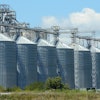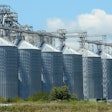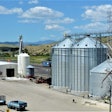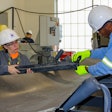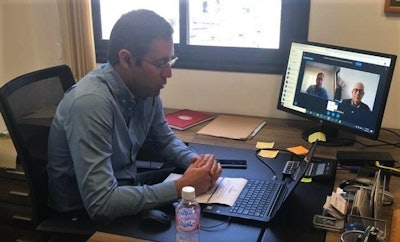
The U.S. Grains Council’s (USGC’s) Regional Center for Feed Manufacturing in Tunis, Tunisia, recently offered training for feed industry representatives in Algeria and Senegal – virtually.
The training center – established with funding from the U.S. Department of State and in partnership with USGC, Iowa State University (ISU), Northern Crops Institute (NCI), South Dakota State University (SDSU), Auburn University and the Tunisian National Institute of Agronomy (INAT) – is focused on enhancing feed manufacturing and animal nutrition expertise by offering robust training to a broad audience in the Middle East and Africa. While trainings are ideally held in-person, pandemic-related travel restrictions are still in place throughout the region, so the Center's leaders have pivoted.
Virtual programs have since allowed Algerian and Senegalese participants to focus on feed manufacturing processes as well as feed management while staying closer to home. While the primary goal of their training was to give participants a broader understanding of manufacturing processes, they also allowed participants to ask questions of course instructors and engage directly with others in the course.
“The Algerian and Senegalese feed grain markets have become more dynamic in recent years with the establishment of several new feed mills in these countries,” says Mohamed Salah Bouthour, USGC marketing specialist for the Middle East and North Africa region. “Training programs, like those funded by the State Department and the U.S. Department of Agriculture (USDA) have marked a shift in USGC’s strategic approach in Tunisia and neighboring countries - a strategy utilizing comprehensive training programs focused on developing and expanding the African feed industry, which is still relatively small compared to other more developed regions."
The training center was started with the intention of educating future leaders within the Tunisian feed and livestock industries. Over the past three years, USGC has trained more than 180 Tunisian feed industry professionals. In December 2019, USGC expanded the program’s focus to be a regional training hub for the Middle East and Africa region, made possible thanks to a $1.3 million grant from USDA.
USGC had a full calendar of training programs slated for 2020, but the onset of the global COVID-19 pandemic required a new approach. Last fall, USGC successfully launched the Center's programs on a virtual platform, allowing its work to continue. This virtual offering combines interactive learning modules with self-study modules covering all aspects of feed manufacturing - from grain storage to particle size reduction. Each module is followed by a short, but comprehensive, quiz. Interactive learning modules include tutorials led by the original Tunisian trainees, which helps them expand their own facilitation skills.
USGC also partnered with the Arab Organization for Agricultural Development (OADA) and INAT to host a team from Lebanon, Jordan, Iraq, Qatar and Sudan the first week of March 2021 to include virtual technical classrooms combined with virtual hands-on feed milling workshops conducted at the Feed Training Center. Virtual visits to a poultry farm, hatchery, slaughterhouse and feed mill are also scheduled.
“Through USGC’s training programs, feed production in the region will become more efficient and widespread as the growing demand for quality feed increases,” Bouthour said. “Ultimately, improved efficiency and feed production in the region will stimulate increased demand for feed grain exports, creating additional or new market opportunities for U.S. feed grains and agricultural products more broadly to the region.”
Learn more aboutUSGC's work in the Middle East and Africa.

